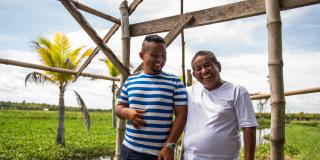
April 2022-2025
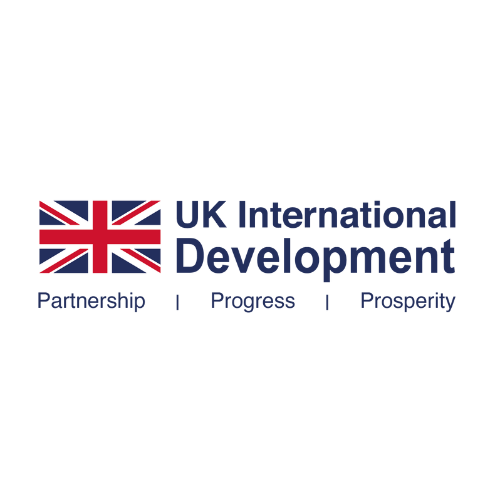
The ACTIVE programme is supporting the development of active citizenship across the Global South so the world’s most marginalised people can lead their own development, claim their rights to better public services, and hold people in power to account.
So far, the programme has reached over 5 million people and mobilised over 20,000 volunteers.
Building on the success of the Volunteering for Development programme, the three year UK government funded programme works towards four goals.
1) Advocacy and promoting active citizenship
The ACTIVE programme supports marginalised people to take action in their own communities on issues that are identified by them and important to them.
2) Engaging governments and the people in charge

Across six countries, ACTIVE is supporting volunteers to monitor disruptions in the provision and uptake of local health services. Community volunteers are trained and supported to monitor the provision of family planning, essential medicines and other key services. The volunteers are supported to consult with local communities using scorecards, and then share their findings in dialogues with health providers.
3) Setting the standard for volunteers globally
VSO is supporting governments, INGOs and institutions around the world to help ensure that people volunteer responsibly and safely, doing no harm to the communities where they work, through the adoption of the Global Volunteering Standard.
4) Providing the evidence and showing what works
VSO is working to increase evidence and understanding on the effectiveness of the volunteering for development approach in citizens' empowerment and system's accountability.
An external mid-term evaluation of the ACTIVE programme found that it had been “very effective in delivering active citizenship and engaging duty bearers constructively” and was “strongly focussed on supporting marginalised groups.”
The evaluation also found that "the programme has found a low cost, highly efficient way of working that is generally highly effective” (external mid-term evaluation, Tripleline, March 2024).
Programme aims
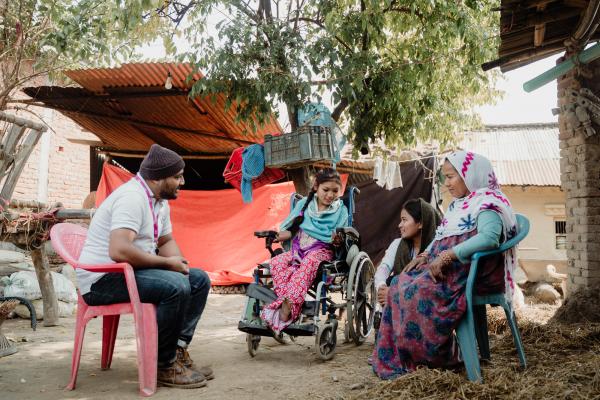
ACTIVE aims to reach 5.5 million people across 19 countries, by mobilising marginalised groups, such as women, young people and those with disabilities, to act on the issues that are most important to them and their communities.
This funding is helping strengthen locally led organisations and create a culture of active citizenship – where marginalised people actively engage with their own development - whilst building the capacity of the UK’s partner countries to respond to the needs of their citizens across healthcare, education and livelihoods.
Creating long-lasting change
The ACTIVE grant is helping to to create more inclusive, open, resilient, and equal societies. It supports marginalised and vulnerable people to take action on development issues that are important to them.
The programme will strengthen civil society and build a culture of volunteerism and civic engagement, whilst also building the capacity of governments and service providers to respond to the demands of their citizens.
By enabling people, and in turn, their organisations and communities, to play a more active role in development, ACTIVE continues to provide the means to achieve more sustainable change.
Learn more about our work
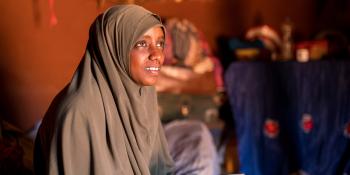
Building bridges for peace through Active Citizenship
For one and a half billion people worldwide, conflict and instability are a daily reality. Our programmes in conflict-affected contexts are powerful enablers in building peace through carefully selected interventions that strengthen social cohesion, foster resilience and stability and empower communities.
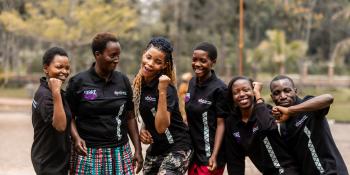
Harnessing the power of youth to change the world
Recognising the immense potential of youth, VSO has been harnessing the power of youth volunteering and engaging young people actively in programming and leadership. This has meant engaging youth as agents of change, integrating their priorities and needs into the development journey.
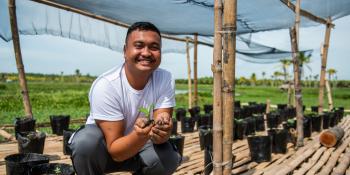
Agroecology: a path to food security and sustainability
Food systems contribute to a third of greenhouse gas emissions, and in turn, climate change exacerbates hunger and food injustice. VSO is working to address these issues by promoting agroecology with smallholder farmers.
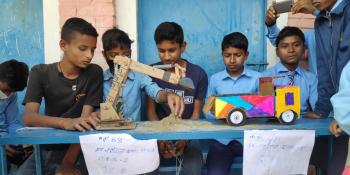
Unlocking education chances for girls and vulnerable children
Globally, one in six children are out of school due to social, economic and cultural reasons. VSO has been supporting marginalised children in developing countries through an innovative community engagement model that accelerates learning for girls out of school.
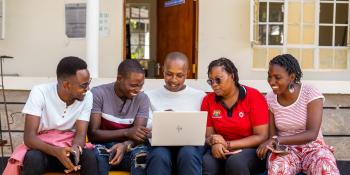
Citizen-led monitoring: fostering accountability for social change
Citizen-led monitoring addresses inequality and poverty by providing citizens with a means to advocate for equitable access to quality public services. In VSO programs this enables primary actors to tell their own stories, share how public services impact their lives and the changes they wish to see.
Setting the standard for volunteers globally
VSO is supporting governments, INGOs and institutions around the world to help ensure that people volunteer responsibly and safely, doing no harm to the communities where they work, through the adoption of the Global Volunteering Standard.
So far over 90 organisations around the world have adopted the Global Standard, including the including national governments, UN agencies, intergovernmental bodies including the African Union and a range of civil society organisations.
VSO is also working with governments to support them to develop national policies and guidelines to enable and promote volunteering in countries such as Cambodia, Thailand and the Philippines. Kenya, Ethiopia, Zambia and Nigeria.
Where we work
Bangladesh
Bangladesh is vulnerable to both disasters and climate change and ranked the seventh extreme disaster risk-prone country in the world as per the report from the Global Climate Risk Index 2021.
In 2017, the largest and fastest refugee influx happened in Bangladesh, when around one million Rohingya refugees took shelter in temporary settlements of Ukhiya and Teknaf camps, further straining socio-economic conditions in host communities, impacting education, livelihoods, and socio-cultural aspects. Among these population, more than half are children.
The ACTIVE project in Bangladesh seeks to create a climate and gender-responsive environment for marginalized communities and position them as active citizens in Bangladesh.
ACTIVE is supporting early childhood education among the vulnerable Rohingya population and the host communities where the live. As of 2024, the project has benefitted 5,000 Rohingya children and youth (aged 3-14) and 1,250 adolescents and youth (age 14-24).
The project has developed disability-friendly learning materials to ensure people with disabilities are not excluded from education. Use of the VSO SCHOOL app has helped improve teachers' capacity in providing a quality and equal education.
Sexual and reproductive education is empowering women and girls by introducing them to previously taboo subjects and helping reduce the stigma around menstruation.
Back in my day, we used to hide ourselves from everyone during menstruation. It was considered as something vicious. Now when we see our daughters can openly talk about this issue and have started to understand and realize that it is nothing but a process towards womanhood, we feel good. We are giving every support that we can provide to them for their healthier future”
- Mothers’ Group Member, Ukhiya
Alongside partner Shushilan the ‘agroecology’ component of the project has trained 420 farmers on how to produce high-value vegetables and how to maintain the fertility of land to ensure it can be used for farming, far into the future. This includes, promoting the use of organic fertilizer, introducing agricultural clinics and climate-adaptive agricultural technology. Young farmers are also supported with rehabilitating from drug addiction, as is common with struggling farmers in the area.
Cambodia
A high percentage of Cambodia’s population live in rural areas, with 75% living outside of cities. The ACTIVE grant in Cambodia aims to contribute to improved active citizenship of marginalized and vulnerable people, as well as local volunteers by working to enhance the capacity of local people to demand their basic rights in health, education, and livelihoods.
Youth Champions in Cambodia have been supported to advocate for the introduction of local volunteering groups for youth at a national level, LGBTQIA+ rights and recognition, holding service providers - such as health centres and education providers - to account, promoting environmental behaviour change in the community, and better solid waste management.
Youths are also advocating for the uptake of The Global Volunteering Standard to ensure that volunteering is used in development responsible and impactful practice.
Eswatini
Eswatini, faces various challenges that affect its young population, including unemployment, limited access to health services and education, as well as political and economic disparities.
These challenges require a comprehensive and collaborative approach involving various stakeholders, including the government, civil society, and international organisations. Efforts are being made to address these challenges and empower the youth in Eswatini.
The ACTIVE programme seeks to increase uptake of Global Standard for Volunteering by relevant stakeholders supporting local volunteers, youths and local people as empowered active participants in civic action or locally led development programmes.
The program also supports VSO's Southern African Network of Prisons (SANOP) project, that works to promote the health and human rights of prisoners and ex-inmates.
SANOP aims to improve access to HIV services and programs for prisoners. This is done through community engagement, increasing the capacity of the health workers and positioning youth networks as advocates for their sexual health rights.
Kenya
Within Kenya, women’s collectives have been a component of VSO’s project activities under ACTIVE with interventions targeting women involving training on life skills, empowerment and entrepreneurship.
Discussions surrounding family planning and sexual and reproductive health and rights (SRHR) have been taken onboard by the community and have been key in allowing women to transition to income generating activities whilst caring for their children simultaneously.
Womens groups have also been supported to use farming techniques that promote climate resilience. Mangrove tree planting has helped to increase the catchment of fish, as well as protecting the land from flooding by serving as a natural barrier to waves, storm surges and tsunamis.
Trainings have helped us raise issues and encouraged women to speak up in meetings.”
In Kilifi, volunteers supported the development of the Climate Change Act and are looking to work further with the county government to disseminate this to women’s collectives.
Climate youth champions have also raised awareness and trained youth on agroecology via webinars. They have also conducted research on the state of food systems and organised dialogues and stakeholder forums to discuss their findings and generate action plans for the priorities that emerged.
Young people in Kilifi are especially passionate about improving access to education for all and in upskilling themselves. Members of the collective began a podcast in 2022, Vito Africa, motivated by prevailing issues within their community. The podcast covers five thematic areas including female empowerment and mentorship.
Malawi
With more than 46% of the population below age 15, and youth (aged 15-29) accounting for more than one-quarter of the population, Malawi is a youthful country. Young Malawians face multiple interconnected challenges and suffer simultaneous well-being deprivations.
The transition from education to the labour market is a critical stage in young people’s lives and can have long-lasting consequences for their wellbeing. In Malawi, around 75% of young people are active in the informal labour market. Education and skills remain strong barriers for young people to getting jobs.
The ACTIVE programme focuses on young people’s involvement in building an evidence-based case, lobbying, and advocating for increased access and utilization of public services including youth economic empowerment opportunities for better standard of living.
The project has been working with targeted youth to build capacity towards improved livelihood and empowerment of youth in Salima district. The activities that were carried out include:
- Skills Development and Training: VSO provided capacity-building and training to empower young individuals with advocacy skills
- Agricultural Innovation: VSO has promoted manure making and modern and sustainable farming techniques to actively enhance agricultural productivity among youth.
- Gender Equality: as part of promoting equality, the project encourages participation from girls and boys, ensuring that young women have equal opportunities for economic empowerment.
Mozambique
Over the past three decades, 14% of the population of Mozambique has experienced droughts, floods, and tropical storms, with over half occurring in the last twenty years. In the context of such natural disasters, environmentally sustainable agriculture, known as ‘agroecology’, has assumed increased importance.
Training in agroecology enables farmers to be independent, producing their own products to increase their livelihoods. Additionally, this includes training communities in resilience and disaster risk reduction.
VSO volunteers have taught local farmers techniques to conserve water and soil resources and increase crop production through agricultural techniques such as crop rotation, intercropping and green manuring. The also supplied kits including seeds, a canvas, a sprayer, hoes, shovels, and other materials used in agriculture.
Female farmers often face cultural, social and economic barriers that limit their ability to fully participate in agriculture, including unequal access to education, resources and land ownership. Since the project more young women are practicing farming and engaging in agroecology to sustain their livelihoods. Young female farmers have increased their income and can now produce surplus food to sell.
Women play a crucial role in agriculture both small and big farms, producing food for their households, communities and beyond. At the family level, the reduced stress of hunger has helped reduce instances of gender-based violence. Women are increasingly taking an active role in educating other farmers on agroecology practices.
We have trained young women to be productive and they are now growing and selling tomatoes. They now have some income of their own and no longer solely depend on their husbands if they need cash.”
Myanmar
Children in Myanmar are experiencing a humanitarian crisis compounded by escalating conflict and the military coup in 2021.The education system has collapsed with an expected 7.8 million children absent from school (SCI, 2022) and over 1.95 million people displaced within Myanmar (2024, UNCHR).
With the on going conflict, millions of parents refuse to send their children to state schools which are now under military rule. There is a growing concern that children will not return to education and will be forced to work to support their families as inflation rates continue to rise.
Under the ACTIVE programme, 311 community volunteers have provided continued education opportunities and emotional support and stability to 2,819 children and 179 parents as well as trained the capacity of 324 teachers to better support and educate their students.
Community volunteers with the Mon Youth Educator Organisation, created small community learning spaces whilst maintaining a low profile, providing emotional support and a safe space to learn. Children attending these sessions include out-of school children, children with disabilities, children who haven't been to school in years, or perhaps have never been to school.
60% of the volunteers on the project have continued to volunteer in their communities in various forms, either continued their role as volunteer trainers or volunteer teachers and others have gone on to employment opportunities in this area, using the skills they learnt from their
From pursuing a careers with local organisations in the development sector, to setting up libraries and tree-planting, given the extremely volatile security context of Myanmar, the retention of young people as volunteers demonstrates commitment and resilience on the part of the communities.
Nepal
Nepal grapples with significant economic poverty, with an overall rate of 25.2%. Within this context, Madhesh stands out as the third-poorest region. Women, children and youths from marginalized communities in particular, bear a disproportionate burden of poverty, enduring unequal access to education, healthcare, and opportunities for personal development, alongside prevalent gender-based violence.
The project focuses on building agency among marginalised groups, so they can claim their rights. Women, girls, and youth are provided with capacity-building opportunities aimed at amplifying their voices and concerns.
A blended volunteering approach is adopted to empower women, girls, and youth to assert their rights to education, health, and economic opportunities. This approach involves mobilising family members, communities, and opinion leaders to support and sustain the empowerment process. Marginalized groups are now advocating for pro-poor, gender-responsive, and inclusive policies.
Family dialogues, ran by volunteers in collaboration with healthcare facility staff are serving as a catalyst for change, fostering awareness on critical health aspects such as nutrition, antenatal care, postnatal care, water, sanitation and hygiene (WASH), and overall health and hygiene within households. There has been positive integration of health and education sectors, particularly in the distribution of medicines in schools with mothers' groups and vaccination clinics being conducted to discuss nutrition, livelihoods, and savings.
Interventions with youths have created shifts in attitudes and behaviours, with adolescents becoming more comfortable in receiving contraceptive tools from youth-friendly healthcare facilities and accessing family planning services.
Nigeria
According to a report by UNDP Nigeria, Africa’s urban population will triple to over 1.3 billion people by 2050, so creating inclusive and sustainable cities are a priority. Increasing population, rural-urban migration, and shifting consumption patterns, are all combining to increase the amount of waste produced, in turn overwhelming the capacity of existing waste collection systems.
The ACTIVE project seeks to use agroecological practices to reduce poverty, inequality, and vulnerability for communities, focusing on women, youths and people with disabilities, who suffer the most restricted access to economic opportunities.
In the face of the climate disaster, conventional resource-intensive agriculture has caused massive deforestation, water scarcities, biodiversity loss, environmental pollution, soil condition depletion, and high levels of greenhouse gas emissions.
The Waste2Wealth project is training women and youth volunteers in ethical waste disposal and introducing them to waste management businesses, the circular economy, and climate-friendly practices to reduce unemployment and promote climate friendly practices
In Kano state, VSO small holder farmers and farming associations are advocating for an agroecology and climate change policy. The aim is for farmers to co-create and interact with organisations, systems, and structures around them to influence change in line with VSO’s volunteering for development pathway of inclusion. This also promotes sustainability and localisation, allowing farmer groups and rural women associations to conduct policy dialogue meetings on agroecology to develop advocacy strategies and frameworks.
Pakistan
Pakistan faces serious challenges, such as high unemployment and a lack of education infrastructure. Over 26 million children are out of school, especially in rural and marginalized areas. Natural disasters like the 2022 floods have made access to education and resources even worse. Despite government efforts, the education system is still underfunded, and many young graduates lack the skills needed for the job market.
To address these issues, the ACTIVE program works with universities in Pakistan to hold discussions with young people about the role volunteerism in community development, and issues that they face as youth. These talks raise awareness and encourage youth to get involved in solving societal problems.
ACTIVE has also created the National Youth Volunteer Network (NYVN) with 25 members. This network helps young people develop leadership and project management skills. NYVN members take on social action projects that improve their communities and empower them to be agents of change.
The NYVN members are actively involved in advocacy work within their communities, focusing on key issues such as health, education, and sanitation. By leveraging their newfound skills and knowledge, NYVN members empower their communities to advocate for positive change and hold duty bearers accountable for implementing policies that benefit youth and society at large.
Philippines
After six decades of conflict, Mindanao in the Philippines is slowly recovering, but peace remains fragile. Despite a 2014 peace deal, concerns persist that extreme weather, worsened by climate change, could escalate ethnic tensions. The ACTIVE project is helping by combining agroecology and peacebuilding, reintegrating ex-combatants and providing them with stable livelihoods to prevent a return to conflict.
One major success is transforming a former rebel camp into an ecotourism destination, showcasing community cooperation. Peace Huts also offer spaces for dialogue, strengthening relationships and promoting ecotourism to protect marshlands, generate income, and foster social cohesion.
By focusing on reintegrating ex-combatants and their families into the community, the livelihood support offers them an income and a stable life, thereby reducing the chances of them returning to active conflict.
One of the project's achievements is the transformation of a former rebel camp into an ecotourism destination, attracting over 1,200 visitors. Through a collaborative effort, volunteers and community members discovered the immense potential of ecotourism and sustainable practices to protect marshlands and generate income from natural resources whilst strengthening social cohesion.
Rwanda
The ACTIVE project in Rwanda, is supporting the Let's Learn Through Play initiative to transform education for children with disabilities by creating inclusive environments in schools, using play-based learning methods.
Rwanda’s education system faces challenges such as a lack of resources for children with special educational needs and disabilities, limited teacher training on inclusive practices, and stigma surrounding disabilities.
To address this, ACTIVE introduced a network of Special Needs Education Coordinators (SNECOs) and Inclusive Education Focal Teachers to lead improvements in supporting children with disabilities in schools.
SNECOs work closely with teachers and school leaders and provide training on how to identify students with learning difficulties and create supportive classroom experiences. They also work with school leaders to ensure that the needs of students with disabilities are included in school improvement plans.
This approach led to a more systematic identification of children with disabilities. Over 10,000 students were identified and supported with Individualized Education Plans (IEPs) tailored to their needs. Schools saw positive changes as more teachers gained confidence in their ability to support all learners.
Additionally, SNECOs conduct community awareness campaigns to reduce stigma, encouraging parents to enrol their children in school regardless of disabilities.
Sierra Leone
In April 2021, the Sierra Leone Cabinet approved the 'National Policy on Radical Inclusion in Schools'. The ACTIVE programme in Sierra Leone focuses on making education accessible for all and to help communities demand better services and hold leaders accountable by:
- Empowering communities: The programme is supporting marginalized groups, including youth and people with disabilities, to speak up for their rights and get involved in local decision-making.
- Media and public engagement: Youth volunteers on the project are using radio and social media to raise awareness about the Radical Inclusion Education Policy, helping more people understand and support inclusive education.
- Improving education for all: VSO volunteers have engaged with schools to create disability-friendly spaces by building ramps, training teachers in sign language, and providing tools to help children with disabilities learn better.
- Positive changes: Awareness raising has led to more children with disabilities enrolling in school, and communities are more supportive of inclusive education.
Tanzania
In Tanzania, many young people lack knowledge about sexual and reproductive health and rights (SRHR), and those seeking services often face privacy concerns and stigma. With one of the world's fastest-growing youth populations, it's crucial to support young people for a better future.
VSO is partnering with youth networks, marginalised women, girls, and youth with disabilities to promote youth-friendly SRHR services. Over 120 youth network members have been trained to spread SRHR knowledge in schools and communities, creating SRHR clubs and holding awareness sessions.
Youth volunteers launched a campaign to address barriers to SRHR services, sharing documentary stories to engage healthcare providers and rural youth, who are now advocates for continued positive change.
The project is also focusing on empowering marginalized groups in the extractive sectors of Mara and Geita regions. It addresses issues like lack of access to quality jobs, social inclusion, and transparency in mining activities. Through the project, community members are trained on their rights, social accountability, and how to engage with local authorities.
VSO partnered with nine Civil Society Organizations (CSOs) to strengthen social accountability efforts, enabling communities to demand better services. In Nyarugusu, these efforts improved health services by providing a functional ambulance, clean water, and increased staffing at a local clinic. Similarly, in Tarime, corporate social responsibility funds were used to provide clean water to 30 households.
The project also responds to climate change challenges by planting over 10,000 trees and promoting sustainable enterprises like beekeeping. Local government and environmental agencies supported these efforts with technical assistance.
The project is successfully building strong relationships with local communities and governments. These collaborations help improve transparency, accountability, and service delivery, especially in health and water access. The SAM (Social Accountability Monitoring) Committees, formed under the project, will continue to advocate for community needs, beyond the project timeline.
Thailand
In Chiang Mai, Thailand, the youth-led "Change Sadness to More Happiness" initiative, run by the Chiang Mai Creative for Development Centre (CCDC), is providing safe spaces for youth to discuss and manage their emotions. Launched through VSO's Youth Voice project, the initiative aims to reduce the stigma around mental health, encouraging young people to build resilience.
By using tools like board games and handbooks, the project teaches youth to recognise and cope with their emotions while also supporting others who may feel isolated. CCDC collaborates with local government and organizations to raise awareness and promote mental health support across the community.
In Makhuea Chae, activities focus on empowering youth to tackle environmental challenges, specifically water pollution caused by dried longan (plant) processing. This pollution has affected the local community for over 20 years, contaminating water sources and impacting public health. Youth in the San Pa Haeng village took the lead in addressing this issue, supported by VSO. They conducted surveys to identify pollution sources, finding that both large-scale factories and small household businesses were contributing to water contamination.
The youth group organised awareness campaigns and engaged key stakeholders, including business owners and schools, to promote sustainable wastewater management practices. Their efforts led to increased community participation and awareness of the environmental and health issues related to improper waste disposal from longan processing.
A significant outcome was the creation of an official project committee, appointed by the Makhuea Chae Municipality, to develop community agreements and policies for managing wastewater. This committee includes youth representatives, local authorities, and business owners, marking a crucial step toward implementing long-term solutions. The project also used the MILE framework to ensure that the youth's voices were central in driving change.
The initiative has not only raised awareness but also empowered the next generation to take ownership of local environmental issues, showing that youth-led action can drive significant and sustainable change.
Uganda
Bidibidi Refugee Settlement is a refugee camp in the Yumbe district of northwestern Uganda. With over 270,000 South Sudanese refugees fleeing the ongoing civil war, it is one of the largest refugee settlements in the world.
The ECCE ACTIVE Project aims to improve access to quality, equitable and inclusive early childhood care and education for children of aged three to ten in the settlement. So far, 4500 learners are enrolled in VSO education centres, with 50 early-grade teachers trained in skills to improve numeracy and literacy among learners and gender-inclusive and disability-sensitive teaching methods.
The project areas of interventions include
- Early childhood care and education
- Early grade teaching and learning to improve literacy and numeracy skills.
- Integrated child health and maternal care through positive parenting sessions
- Livelihood support programs for parents of children with disabilities
Zambia
In Zambia, approximately 70% for the population are aged between 15 and 35 years old, with 53% being under age 18. Barriers like limited access to Sexual and Reproductive Health and Rights (SRHR) information, societal norms, inadequate education, and prevalent early pregnancies and teenage marriages, especially in rural areas, obstruct their opportunities in society.
The ACTIVE project in Zambia focuses on helping young people learn about sexual and reproductive health. Through training, young people gained knowledge on important topics such as pregnancy, early marriages, and contraception. The project also involves organising workshops and meetings where youth can engage with local leaders to advocate for better health services.
The ACTIVE project involves marginalised groups in meetings, trainings, and workshops. The goal is to reduce stigma and discrimination by ensuring their voices are heard. In Samfya, people with disabilities, who don’t usually join youth groups, are now participating actively. Teenage mothers, including those still in school, can also attend youth spaces with their children to accommodate different needs.
As a result, many young people are now more confident in accessing health services and addressing these issues in their communities. The project has also helped reduce stigma and increase awareness about sexual health rights.
Zimbabwe
In Zimbabwe, VSO empowers smallholder farmers to advocate for resilient and secure livelihoods, integrating health into the project, particularly sexual and reproductive health and rights (SRHR). Through the ACTIVE programme, VSO has empowered youth community volunteers to enhance these climate-resilient health systems.
VSO has trained over 30 youth community volunteers to conduct risk assessments to identify and address SRHR challenges. Their efforts have led to action plans and initiatives, like the Stop the Bus Campaign, which delivers SRHR, maternal health services and counselling to vulnerable and hard-to-reach communities.
Additionally, they have also led awareness campaigns about water, hygiene and sanitation, particularly about cholera before and during the rainy season. Youth-led initiatives also include SRHR and climate change quizzes and sports competitions for youth groups and high school students, and the distribution of sexual reproductive health Dignity Kits to young women farmers and schoolgirls.
The ACTIVE project in Zimbabwe also aims to empower marginalized groups through agroecology, promoting sustainable farming practices.
It operates in areas severely impacted by climate change, such as Chimanimani and Mashava, where agriculture is crucial for livelihoods. The project focuses on improving food security, income, and resilience, while also promoting gender equality and social accountability.
Key interventions include setting up agroecology demonstration plots, training farmers on sustainable practices, and creating seed banks to ensure food sovereignty. Women have taken on leadership roles in these activities, managing seed banks and leading agricultural committees. Youth are also actively involved, participating in agroecology, beekeeping, and fish farming, which contribute to household food security.
The ACTIVE project continues to build resilience against climate shocks and foster long-term sustainability through agroecology.
Providing the evidence and showing what works
VSO is working to increase evidence and understanding on the effectiveness of the volunteering for development approach in citizens' empowerment and system's accountability.
Latest news from ACTIVE
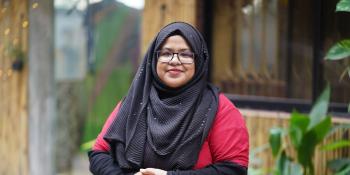
Breaking barriers: Lamia's journey of volunteering, leadership, and gender equity
Bangladesh - Lamia Tasnim's volunteering journey began in 2018, and over the course of the last six years, her passion for supporting her community has only grown.
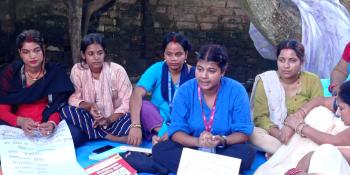
Empowering change: The role of female leadership in advancing women's rights
Growing up in the heart of Madesh Province in Nepal, Aarati Patel witnessed first-hand the harsh realities that many women and girls in my community face daily. Hear how she's supporting girls in Nepal to find their voice and create a world where every girl has the freedom to choose her own path.
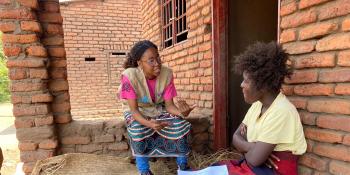
Two volunteers who are tackling food insecurity in Malawi
Malawi - Climate shocks, including droughts, floods, and storms, adversely affect livelihoods and food security in Malawi. Two formidable volunteers are helping to address the challenges of food security through sustainable farming methods.
